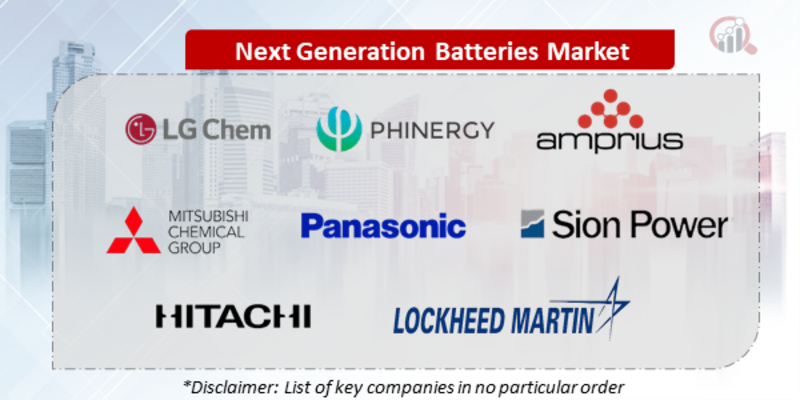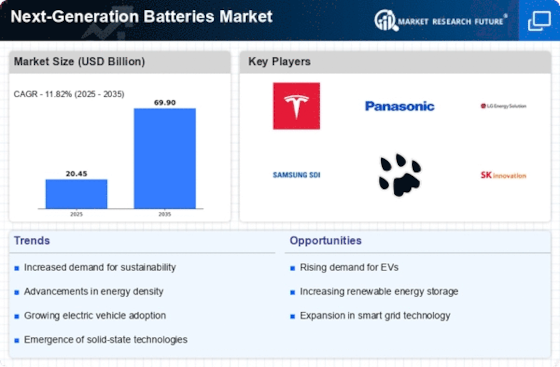Top Industry Leaders in the Next Generation Batteries Market

The Competitive Landscape of the Next-Generation Batteries Market
Across electric vehicles humming down highways, energy grids pulsating with renewable power, and mobile devices whispering connectivity, a silent revolution unfolds – the rise of the next-generation battery. This dynamic market pulsates with the competitive energy of players vying for control over these potent conductors of the energy transition. Unveiling the strategies, crucial factors, and overall landscape of this intricate market is vital for navigating its currents and securing a leading position.
Some of the Next Generation Batteries companies listed below:
- LG Chemicals
- Phinergy
- Amprius Inc.
- Mitsubishi Chemical
- Seeo
- Panasonic Corporation
- Sion Power
- Envia Systems Inc.
- Ambri Inc.
- Hitachi
Strategies Adopted by Leaders:
- Technological Prowess: Tesla and Panasonic lead the charge with advanced lithium-ion battery technologies boasting extended range, fast charging capabilities, and superior safety, catering to demanding needs in electric vehicles and consumer electronics.
- Vertical Specialization: CATL and LG Chem focus on specific segments like large-scale energy storage or marine applications, achieving unmatched expertise and cost-effectiveness within their chosen domains.
- Material Science Innovation: Samsung SDI and Sony invest heavily in R&D for next-generation cathode and anode materials like silicon and lithium metal, promising higher energy density and potentially shorter charging times.
- Focus on Sustainability and Recycling: Companies like Redwood Materials and American Manganese Inc. prioritize responsible sourcing, environmentally friendly battery production, and efficient recycling infrastructure, building brand loyalty and mitigating environmental concerns.
- Integrated Solutions and Platform Play: Tesla and Siemens offer comprehensive energy storage solutions including batteries, software management systems, and grid integration technologies, simplifying adoption and maximizing system efficiency.
Critical Factors for Market Share Analysis:
- Energy Density and Range: Companies offering batteries with greater range per charge command premium prices and secure market share in electric vehicles and portable devices, driving consumer adoption and reducing range anxiety.
- Charging Speed and Power: Batteries facilitating rapid charging or high-power output cater to diverse applications like electric buses, grid stabilization, and fast-charging infrastructure, increasing market potential.
- Safety and Durability: Providing robust thermal management systems, extended lifespans, and minimal performance degradation is crucial for gaining trust and ensuring long-term value, particularly in critical applications like medical devices and aviation.
- Cost Competitiveness and Affordability: Balancing advanced functionalities with an attractive price point is crucial for capturing market share, particularly in price-sensitive sectors like grid storage and low-cost electric vehicles.
- Sustainability and Responsible Sourcing: Adhering to ethical mining practices, minimizing environmental impact during production, and ensuring efficient recycling pathways are increasingly important for meeting ESG goals and attracting environmentally conscious consumers and investors.
New and Emerging Companies:
- Startups like QuantumScape and Solid Power: These innovators focus on developing next-generation solid-state batteries with enhanced safety, higher energy density, and potentially faster charging, challenging established players with disruptive technologies.
- Academia and Research Labs: MIT's Energy Initiative and Stanford University's SUNCAT Center explore disruptive technologies like lithium-sulfur batteries, sodium-ion alternatives, and organic flow batteries, shaping the future of energy storage solutions.
- Material Science Companies: Dow Chemical and 3M invest heavily in R&D for advanced electrolytes, separators, and conductive materials, enabling the development of high-performance and sustainable batteries.
Latest Company Updates:
Nov. 24, 2023, Koike, a subsidiary of finance company Orix, announced the development of a new material that promises to extend solid-state battery life greatly. The new single-crystal electrolyte that can lower resistance is developed with a government lab to extend solid-state battery life, an emerging next-generation technology. Koike worked with the National Institute of Advanced Industrial Science and Technology (AIST) to produce this single-crystal material that can be used as an electrolyte in solid-state batteries.
Nov. 21, 2023, Battery manufacturing major Northvolt announced the addition of sodium-ion batteries to its portfolio. The company has successfully validated sodium-ion batteries with an energy density of over 160 watt-hours/ kilogram at its R&D and industrialization campus at Northvolt Labs, Västerås, Sweden. The sodium-ion battery technology was developed with research partner Altris. Northvolt intends to make the new battery tech the foundation for its next-generation energy storage solutions.
Oct. 30, 2023, Researchers at the University of Maryland announced the development of a new battery technology that could enable safer next-generation EVs and other devices. The new technology can suppress the growth of lithium dendrites, a damaging factor that develops inside all-solid-state lithium batteries, preventing firms from broadly commercializing the promising technology. This new battery design avoids dendrite formation and could allow the production of viable solid-state batteries for electric vehicles.
Sep. 21, 2023, The Japanese carmaker Toyota announced that it is developing next-gen batteries with a 1000km range. The company detailed its new battery technology roadmap, planning to develop four next-generation battery types, including new liquid electrolyte and next-gen solid-state battery technology. The Performance battery packs developed using lithium-ion chemistry will arrive in BEVs in 2026.










